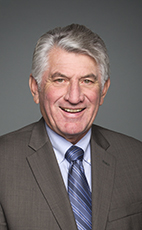Mr. Speaker, like those who have gone before me, I would like to congratulate you on your new role. Obviously, it means that you will not be sitting on all those committees with the rest of us.
I rise in response to the question put to the House by my hon. colleague, the member for Windsor West, regarding the western hemisphere travel initiative of United States.
Canada recognizes and shares the U.S. security concerns, which the western hemisphere travel initiative is attempting to address through improved security of documentation. At the same time, we have questions and concerns about whether the initiative, as proposed, fully serves the interests of both our countries, particularly in light of what we know about the negative impacts on trade, tourism and border communities. Such concerns have been raised on a number of occasions with our American counterparts, including President Bush, Homeland Security Secretary Chertoff and Secretary of State Rice. I would also note that these issues have also been brought forward by a number of representatives in the U.S. Congress and Senate.
That being said, the western hemisphere travel initiative is a law passed by a majority in the U.S. Congress and President Bush has clearly stated that he will abide by it. Therefore, it is incumbent upon this government to take the necessary and appropriate steps in preparation to meet these deadlines. This includes collaborative work between the most senior officials in both Canada and the U.S. to explore alternative documents other than the passport and the United States pass card for securing efficient cross-border travel.
The Minister of Public Safety recently had a series of meetings in Washington with Secretary Chertoff and other senior U.S. officials, and good progress was made on several fronts. In particular, it was clarified that the U.S. remains open to the idea of alternative documents, other than the proposed passport or pass card, for the purposes of cross-border travel. This is important as we continue to address with our American counterparts the need for affordable and easy to obtain documentation that meets the security requirements under the western hemisphere travel initiative.
I am pleased to report that the Minister of Public Safety and Secretary Chertoff were in full agreement that wherever possible, our two countries should look for opportunities to enhance the flow of trade and travel across the border, and we will continue to examine options to make this work. Secretary Chertoff will be coming to Ottawa in late May or early June so we can jointly assess our progress on this critical issue under the western hemisphere travel initiative.
While this joint Canada-U.S. work moves forward, we at the same time remind Canadian citizens who may wish to travel to the United States after January 1, 2007, that they will be able, as always, to use their Canadian passports. What is of critical importance to both countries is how best to implement a meaningful solution which ensures that our borders are open for legitimate trade and travel and closed to terrorists, drug dealers and smugglers.

